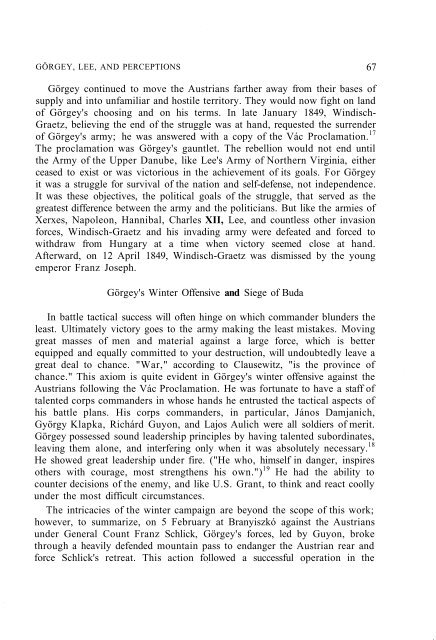HUNGARIAN STUDIES 11. No. 1. Nemzetközi Magyar ... - EPA
HUNGARIAN STUDIES 11. No. 1. Nemzetközi Magyar ... - EPA
HUNGARIAN STUDIES 11. No. 1. Nemzetközi Magyar ... - EPA
- No tags were found...
You also want an ePaper? Increase the reach of your titles
YUMPU automatically turns print PDFs into web optimized ePapers that Google loves.
GÖRGEY, LEE, AND PERCEPTIONS 67Görgey continued to move the Austrians farther away from their bases ofsupply and into unfamiliar and hostile territory. They would now fight on landof Görgey's choosing and on his terms. In late January 1849, Windisch-Graetz, believing the end of the struggle was at hand, requested the surrenderof Görgey's army; he was answered with a copy of the Vác Proclamation. 17The proclamation was Görgey's gauntlet. The rebellion would not end untilthe Army of the Upper Danube, like Lee's Army of <strong>No</strong>rthern Virginia, eitherceased to exist or was victorious in the achievement of its goals. For Görgeyit was a struggle for survival of the nation and self-defense, not independence.It was these objectives, the political goals of the struggle, that served as thegreatest difference between the army and the politicians. But like the armies ofXerxes, Napoleon, Hannibal, Charles XII, Lee, and countless other invasionforces, Windisch-Graetz and his invading army were defeated and forced towithdraw from Hungary at a time when victory seemed close at hand.Afterward, on 12 April 1849, Windisch-Graetz was dismissed by the youngemperor Franz Joseph.Görgey's Winter Offensive and Siege of BudaIn battle tactical success will often hinge on which commander blunders theleast. Ultimately victory goes to the army making the least mistakes. Movinggreat masses of men and material against a large force, which is betterequipped and equally committed to your destruction, will undoubtedly leave agreat deal to chance. "War," according to Clausewitz, "is the province ofchance." This axiom is quite evident in Görgey's winter offensive against theAustrians following the Vác Proclamation. He was fortunate to have a staff oftalented corps commanders in whose hands he entrusted the tactical aspects ofhis battle plans. His corps commanders, in particular, János Damjanich,György Klapka, Richárd Guyon, and Lajos Aulich were all soldiers of merit.Görgey possessed sound leadership principles by having talented subordinates,leaving them alone, and interfering only when it was absolutely necessary. 18He showed great leadership under fire. ("He who, himself in danger, inspiresothers with courage, most strengthens his own.") 19 He had the ability tocounter decisions of the enemy, and like U.S. Grant, to think and react coollyunder the most difficult circumstances.The intricacies of the winter campaign are beyond the scope of this work;however, to summarize, on 5 February at Branyiszkó against the Austriansunder General Count Franz Schlick, Görgey's forces, led by Guyon, brokethrough a heavily defended mountain pass to endanger the Austrian rear andforce Schlick's retreat. This action followed a successful operation in the
















